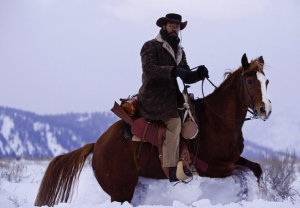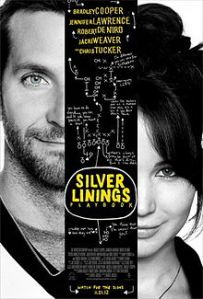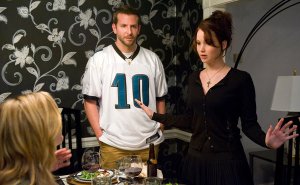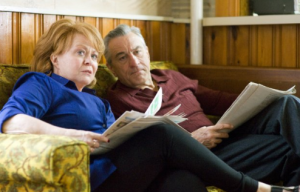
Quentin Tarantino is back, and with him he has brought a truly remarkable piece of work. Django Unchained is the story of Django Freeman, a slave who finds his freedom and sets out to find his wife, from whom he was tragically separated. In the spirit of the old western and also of classic slavery films like Roots Tarantino attempts not only to approach the nasty topic of slavery, but to compose a sort of epic tale of heroism for blacks, that has been curiously absent from cinema where this particular bit of history is concerned.
Like all of Tarantino’s films, the cast is wonderful and strange. In a line-up you wouldn’t quite understand how all of these actors and actresses fit together, but Tarantino’s perverted and imaginative methodology acts as a sort of equalizer. The film stars Jamie Foxx as the title character Django, Christoph Waltz as bounty hunter and retired dentist Dr. King Schultz, Kerry Washington as Django’s wife Broomhilda, Leonardo DiCaprio as plantation owner Calvin Candie, and Tarantino’s favorite player Samuel L. Jackson as the detestable Uncle Tom, Steven.
Unsurprisingly all of the actors gave astoundingly wonderful performances. Each character clearly represented an attitude

and point of view relevant to the time period, and each actor embodied that point of view with surgical precision. The pressure was on for Foxx, seeing as a western needs a strong, unique leading man whose charm and determination set the tone for the film. In this, I would say that Foxx succeeded. His was one of the more dialed back performances, despite the jarring violence he was charged with portraying. This quality juxtaposes nicely with Tarantino’s poppy, in your face style of storytelling. Waltz on the other hand showed the same indescribable charm that we saw in Inglorious Basterds. Dr. King Schultz, the

character, adds an interesting and foreign element to the slave story we are accustomed to hearing. Washington had very few lines, but astoundingly her performance was the strongest. She conveys more

emotion with her body and her countenance than most of the films actors do throughout. DiCaprio fits into this character role so naturally and vibrantly that it was almost theatre. You got the feeling that his portrayal of Calvin Candie was literally the character that Tarantino formed in his mind. Jackson was truly and unbearably horrid, which means of course that he did his job exactly. He has that ability, to step into a role and give it exactly what it needs. Overall, the cast was tuned perfectly. Even down to the peripheral characters.
Django, as a telling of a man who wants to find his wife, is powerful and beautiful. Django as a retelling of slave times, was not told gently, but rather brutally. It was told, in many ways, how it was, with frequent use

of the word “nigger” from both the white and black actors. The film included mandingo fighting, klan riots, whipping, scientific racism, slave trading, prostitution, and all manner of racial politics. While humorous in places, it was as honest a telling as can be expected from this director, and he did well with the subject matter. Django as a story that gives black people a western hero, was a success. Tarantino made a film that deals with the darker side of U.S. history, but also made a film that tells a story about black people, and black love, which is lacking outside of films made exclusively by black film makers.
As with most of his films, Tarantino injects style into every aspect of a film. The soundtrack was wonderfully various. The inclusion of a theme song, along with songs specially made for the film like Rick Ross’ 100 Black Coffins. Everything from the music to the font of the captions, to the schmaltzy close ups throughout the film. Everything Tarantino does works because he does it with such candor. With such a remarkable posture, it is hard to imagine Tarantino doing any wrong.
I could go on about how personally impressed I am with Tarantino’s ability to tell stories, but I would mostly like to impress upon you the importance of this particular story. Most films are attempting to tell stories that have already been told. With Django, Tarantino tells a new story in a new way. And this particular story is so needed.
Rating: 10/10






